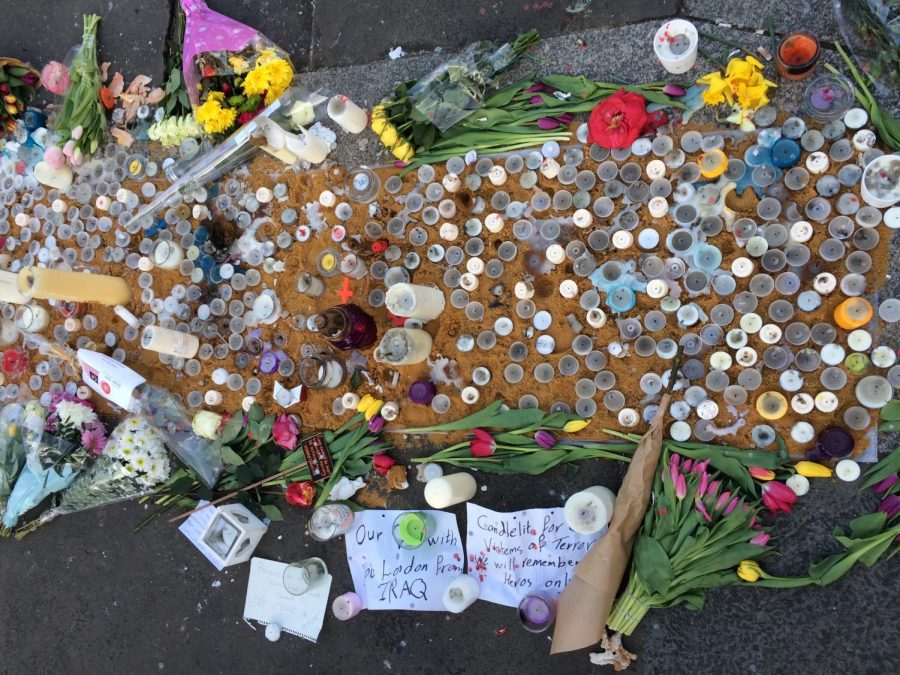European violence sparks unease for some citizens, but UNCW students abroad feel fine
Hannah Williams
LONDON, ENGLAND–A makeshift memorial for those who lost their lives in the Westminster Bridge attack
For years, terrorist attacks around the globe have caused unease to spread throughout the general populace. For some citizens traveling abroad currently or in the future, it has caused a slight apprehension, especially among those seeking to travel to Europe.
While terrorism can happen anywhere at any time, the increased number of attacks in recent months have worried some that a dangerous trend may be emerging. The constant exposure from the mass media in developed nations has only seemed to exacerbate the problem.
Since the New York City truck attack along the West Side Highway, the topic has only become more increasingly discussed. New York’s truck attack was also the fifteenth such vehicular attack by jihadist terrorists in North America and Europe since 2014, according to New America, a nonpartisan research institution.
Since the Charlie Hebdo shooting in 2015, 14 high profile terror attacks have occurred throughout Europe and North America. Such attacks have included the Paris attacks in November 2015, the Brussels bombings, the Nice attack, the Westminster Bridge attack and the Manchester Arena bombing.
UNC Wilmington has hundreds of students studying abroad each semester. With the coming spring semester, some students are apprehensive of traveling, whereas others are still comfortable with the idea.
“II do feel comfortable. I try not to think about those things,” said Emily Blake, a senior at UNCW. Blake is studying abroad in Buenos Aires during Spring Break 2018.
“I think life should be lived to the fullest without fear of stuff like that happening. Because in reality, anything could happen any time, so I mean, you can’t live in fear or you wouldn’t ever do anything.”
Blake’s beliefs have presented similarly to other UNCW students who are not afraid of overseas violence, simply because it can – and does – happen in the United States as well.
Stephen Nymberg, a junior, is studying abroad at the University of Valencia in Spain this upcoming Spring. His opinion was of slight unease at first, but he said he recently realized that some European citizens warn their students about America – the same thing that some Americans do about Europe – before going abroad.
“[A friend of mine] was warned, and people were like ‘how are you going to the U.S., it’s so dangerous,’ but it’s just that shit happens everywhere and that’s the only thing you hear about in other countries,” Nymberg said.
Studying abroad, while a popular decision for many college students throughout America, has become more focused in the news as of late – due to the fact that many American students study abroad in European capitals, where terror attacks have been taking place more frequently.
Normally, during U.S. news coverage of attacks in Europe, it is mentioned how many American foreign exchange or study abroad students were involved, in addition to tourists.
55 percent of American study abroad students choose Europe to study in, which prevails as the number one destination, according to report by Forbes.
According to the 2017 Open Doors report from the Institute for International Education (IIE) – an independent nonprofit organization that partners with the U.S. Department of State — five of the top 10 most popular study abroad destinations for U.S. students are in Europe.
The U.K, Italy, Spain, France and Germany were the top five study abroad nations for American students in 2016, accounting for 40.9 percent of the total 325,339 studying abroad during the 2015/2016 school year, according to the same report from the IIE.
“I’m not really too nervous about it, but that may be because I may be one of those people that thinks it won’t happen to me,” said Justin Van Heukelom, a junior studying at the University of Hertfordshire in England next semester.
“There’s millions of people who live in London and hardly even a fraction of them have been victims of terrorism,” he continued, “I won’t be in London for most of my time there either, so I’d probably be more anxious if I was going to school in London.”
Many UNCW students planning to study abroad have little to no apprehension about traveling.
Terrorism is meant to instill fear in the populace, but breaking free from that intended outcome and defying it with boldness is a new ideal that has been gaining strong support among Western youth.
“Although I don’t trust the foreign countries to protect me as much as the U.S. may,” says Junior Nick Lazzati, studying abroad at the University of Valencia in Spain next semester, “it shouldn’t make you miss out on experiencing life, if it does then you’re letting the terrorists win because that’s exactly what they want.”
Tyler Newman can be reached on Twitter at @tnewman39, and through email at [email protected].
Lanre Badmus can be reached on Twitter at @LonnyBadmon.








